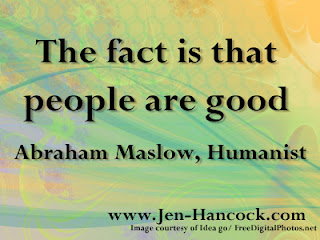How a change in perspective can make all the difference in
the world.
It’s Good Friday, but I’m a Humanist, so the religious
implications of the day mean pretty much nothing to me. I do however LOVE the name of this holiday.
Good Friday. It implies that it’s going to be a good day. And that’s a good
thing. Isn’t it?
Life would be wonderful if it was filled with good days. But
I suspect that most of us would be grateful if we managed to have a Good Friday
now and again. Which begs the question, how does one go about having a good
day?
To me, a good day is one where I feel good, pretty much all
day. Nothing major happens bad or good. Just, life goes on as it should. There
are people in my life I care about, who I can spend time with. I eat good food
and have time to enjoy it. I get to notice nature and appreciate it and the fact
that I am alive.
As I write this list I realize that almost everything in my
list is within my control. Am I a good enough person to attract good people to
me? Am I appreciating my life in the present? Do I notice my food or the
weather and appreciate it for what it is? The more I make that a habit, the
more I see my days as pretty darned good over all.
As I have gotten older, I have come to realize. Most days
are pretty boring. Nothing much happens out of the ordinary. There are just a
myriad of little details that need to be attended to and a myriad of little
aggravations that have to be worked around. I no longer let those bother me.
They are just part of the business of being alive. I don’t need to get worked
up over them.
So stop waiting to have a good day and start appreciating
the days you already have, actively. Take a moment every day to appreciate the
fact that you are alive and that you can feel the wind on your skin and the pull of gravity. As far as I am concerned, any day I am alive and
able to experience life is a good day, even when it’s not.
What makes you feel glad to be alive?








